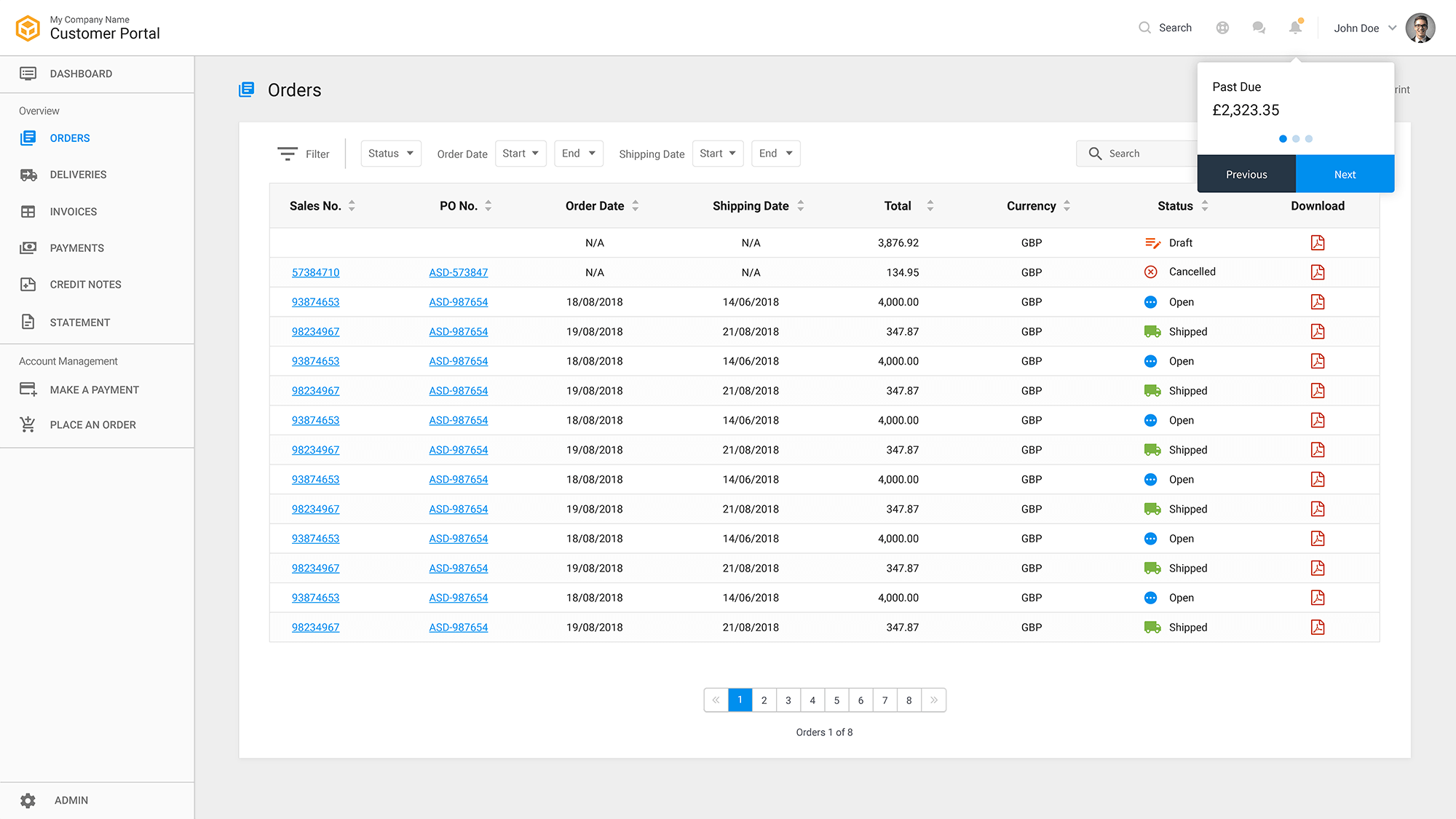Uncovering the advantages of web portals
Web portals are fast becoming an integral tool for businesses looking to improve internal and external communication and collaboration. With b2b web portals, companies can communicate securely and easily with their partners, suppliers, and customers to enable real-time access to information, and add the ability to provide personalised services to the user. Overall, the advantages far outweigh the disadvantages of web portals, making them an essential tool for modern businesses looking to stay ahead in a competitive market.
Often used as a way to improve B2B interactions and as a means to streamline day-to-day operations, web portals can be seen as the key to driving operational success. In this article we take a look at the advantages of web portals and how they can help you transform the way you interact with customers, suppliers and business partners.
What are B2B web portals?
Web portal definition and purpose
A B2B web portal is a digital platform that serves as a centralised gateway or point of access to information, services and resources. A B2B portal is designed for organisations to streamline access to business information, documentation and products to improve communication and transactional activities between customers, suppliers and business partners and other entities within the business ecosystem.
Key features of B2B portals
B2B portals provide organisations with the ability to modernise business-to-business transactions and can help structure day-today operations. The key attributes of B2B portals enable businesses to optimise operational workflows, facilitate collaboration and drive company growth whilst improving employee productivity and enriching customer interactions.
Common B2B portal features include:
User management functionality empowers organisations to define user access levels, permissions, and roles that are tailored to individual users and their requirements. This ensures that the user can securely access information that is relevant for their needs in a controlled environment. In turn, this assists data security and confidentiality.
Having product management functionality enables product managers to efficiently create, update, and present products and services in an organised format. This feature can include comprehensive product catalogues that can tailor specific product specifications such as pricing and availability.
A B2B portal can help organisations oversee the whole order lifecycle by providing real-time visibility into various stages such as order placement, status updates, transactions, invoicing, tracking and fulfilment. Improving order management processes reduces manual processing errors and can enhance customer experience.

Image: Web portal order management example.
A key feature of implementing a B2B web portal is to ensure that it provides secure online payment processing. This will allow you to quickly and easily accept payments for goods and services. It also makes life easier for the end user as they will be able to arrange payment 24/7, 365 days a year. B2B portals that provide online payment functionality can seamlessly integrate with multiple payment gateways such as Stripe, WorldPay and PayPal. This functionality can also support invoicing, credit terms, and multiple payment methods to cater for diverse business needs.
Inventory management and monitoring functionality allows organisations to track inventory levels and locations. It can help to prevent the risk of overstocking and understocking to ensure that your inventory levels are at an optimal level at all times. It is also an essential feature to streamline supply chain operations which can be further enhanced through integration with your primary business systems. Integrating your web portal with existing systems will help you to streamline the whole inventory management process from tracking, automated stock replenishment and inventory planning.
B2B portals play a crucial role in safeguarding an organisations data. This is achieved through various authentication options and advanced access controls with industry standard security measures such as Secure Sockets Layer (SSL) and Hypertext Transfer Protocol Secure (HTTPS). Enhanced security features such as Base64 encoding, single sign-on, password expiration policies and the ability to restrict access to specific IP addresses for individual users ensure robust data protection.
Analytics and reporting functionality can provide you with an intuitive dashboard to help organisations identify trends and opportunities for growth. This feature increases the visibility into sales team performance and customer behaviour to aid management decision-making.
B2B portals facilitate collaboration and improve communication between employees, customers, business partners and suppliers. This web portal feature can include document sharing, user forums, task assignment, and messaging functionality to strengthen relationships and improve collaboration.
System integration is often a pre-requisite with many organisations when they're looking to implement a web portal. Some B2B portal development companies provide data integration capability to ensure seamless data synchronisation between your web portal and primary business systems such as an ERP or CRM system or company website. Some integration engines can offer advanced automation capabilities that can extend beyond the initial requirement so it's worth mapping out your business processes beforehand to ensure end-to-end automation. Integration can be achieved through many means that can include APIs (REST and SOAP), web services or connection to SQL server.
Customisation options can be used to mirror your organisations branding or to meet specific operational needs. Low-code tools are used to build and customise your web portal to meet your exact business needs and requirements.
9 Benefits of Web Portals
When combining the features, capabilities and benefits of web portals, a portal solution becomes an essential tool in business-to-business environments. They serve as a versatile platform that optimises business operations, improve user experiences, and contribute to organisational goals and objectives. Whether in B2B or B2C contexts, web portals offer numerous benefits, including improved navigation, content integration, cost reduction, and revenue growth. The primary advantages of web portals include:
Common benefits of web portals include:
Streamlined processes: B2B portals streamline business processes and day-today operations by providing a centralised platform for communication, collaboration, and transactions between companies. It provides the ability to reduce paperwork whilst improving document sharing processes and will reduce manual data administration to eradicate administrative errors. The ability to streamline operational processes through web portals also aids decision making by increasing the visibility of critical information.
Increased collaboration: B2B web portals significantly enhance collaboration both internally with employees and externally with business partners. Internally, web portals serve as a platform for employees to share information, documentation, and resources to facilitate communication across departments. Collaboration can be improved through real-time messaging, project management tools, and document repositories.
Externally, web portals support collaboration with external stakeholders such as suppliers, clients and distributors. Role-based access can be provided with secure logins so that organisations can provide selective permissions that will enable the user to interact with relevant tools and data. This improves communication and enhances relationships with external parties.
Data analytics and insights: Having data analytics and insights within your web portal helps businesses to make informed, data-driven decisions and improve strategic planning. Web portals allow access to critical business information which provides the ability to analyse user interactions, purchasing behaviour and gain insights into transactional data.
Accessibility: B2B portals significantly improve accessibility to data, information and documentation that enables users to easily access, find, and collaborate with resources. Through secure logins and role-based access controls, web portals ensure that authorised users can retrieve information that is relevant to them, whilst protecting sensitive data.
Scalability: Another advantage of web portals is their scalability. The scalability of web portals is the ability to accommodate operational growth and increased usage over time without reducing performance or functionality. A scalable web portal provides the ability to handle larger amounts of data, users and transactions whilst maintaining reliability and responsiveness.
Competitive advantage: B2B web portals provide a competitive advantage by enabling businesses to operate more efficiently and collaborate more effectively with business partners. Web portals also deliver personalised experiences to customers and leverage data-driven insights. The scalability of web portals enables organisations to quickly adapt to changing market dynamics and trends.
Improved communication: B2B web portals significantly improve communication across departments and external stakeholders by providing a platform for users to interact, collaborate, and share information. Communication can be improved through real-time messaging, document sharing, task assignment and tracking and notifications and alerts.
Enhanced efficiency: A combination of automated processes, centralised information and repositories for data, integration and a customisable experience all contribute to the overall efficiency within an organisation. These web portal features allow businesses to optimise their workflow processes and day-to-day operations, reduce costs and improve business partner and customer experience.
Customised user experience: Another advantage of web portals is the ability to provide a customised user experience. This is achieved by offering personalised dashboards, role-based access controls, customisable workflows, personalised content, multi-language support, and self-serve capabilities. The ability to customise helps to meet user needs and expectations, drive engagement, and differentiate from competitors.
B2B Portal Development Services
Here at Applications Platform we provide you with market-proven B2B portal development services that have been tried and tested in a wide range of business scenarios. Our B2B portal solutions are fully integrated with your existing business systems, powered by enterprise-level low-code technology.
Our Professional Services team helps you to simplify the portal development process including planning, development, customisation and deployment to help you go to market quickly, on time and within budget. Get in touch for more information or to discuss your web portal requirements.

